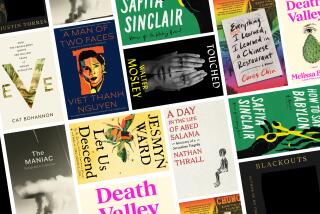Book review: ‘How Did You Get This Number’ by Sloane Crosley
- Share via
How Did You Get This Number
Essays
Sloane Crosley
Riverhead: 288 pp., $25.95
The nine essays in Sloane Crosley’s mostly winning new collection, “How Did You Get This Number,” revolve around the author’s attempts to get things right. They find her alternately hunkered down at home in New York and way out of her element, looking to the future and lost in the past. Adding another layer to the mix: As Crosley strives to line up the ingredients of a successful life, she’s also trying to live up to her first collection of essays, 2008’s bestselling “I Was Told There’d Be Cake.”
Perhaps inevitably, this new work feels more self-conscious than that first book, which was written in blissful absence of expectations. Crosley’s subjects — international travel, childhood troubles, the search for an apartment — sometimes seem the offshoots of an intensive mining of her pre-bestseller life. Anecdotes that surely make her a popular dinner party guest can feel somewhat overblown in print. “An Abbreviated Catalog of Tongues,” in which she inventories her family’s many pets, hews a bit too close to the look-at-my-crazy-family boilerplate, while “Show Me on the Doll,” an account of being aimless and forlorn in Lisbon, is a little directionless itself.
Happily, though, Crosley usually manages to stretch her stories beyond any thin specifics and occasionally transcends them altogether. In “Le Paris!,” another essay about misguided if well-intentioned tourism, she recalls the deliberateness with which she approached her first tour of the titular city: “This trip was our cultural vaccination. We’d see and do everything touristy we could so that one day we might come back as real adults and not have to go to a single museum or dead person’s mansion.” Equal parts hopefulness and resignation, this kind of anticipation — where everything exists in multiple dimensions, pulsing with consequence — really gives Crosley’s words weight.
In what feels like the book’s centerpiece, “Light Pollution,” Crosley visits Alaska for a friend’s wedding; her sightseeing is interrupted by an unsettlingly literal collision between man and nature. The ensuing piece is stunning, built on the delicate balance of strange and ordinary that infuses the author’s work at its best.
“If You Sprinkle” — a devastating take on the passive-aggressive friendships between preteen girls — recalls a hilarious, wrenching effort from her first book about reluctantly serving as maid of honor at a high school friend’s wedding. Together, these two essays make a case for Crosley as one of our most candid correspondents self-assigned to the beat of grim, ultra-feminine rituals. “My relationship with Zooey,” she writes of one former sleepover pal, “is not unlike a bag of potato chips that, once the chips were freed from their bloated prison of air, is about ninety percent space and ten percent chips.”
There are standout adventures, sure, but Crosley’s life appears mostly overrun with frustration — thieving roommates, the ghosts of dead pets and taxis that smell so bad she has to leap out before she’s traveled a block. “[W]e are drawn to things we can’t afford and people call it ‘taste’ to make it palatable but what it really is is a kind of superficial cloying for happiness,” she reflects in the sober concluding piece, “Off the Back of a Truck,” in which she develops parallel relationships with a shady purveyor of discounted luxury housewares and a charming liar who may or may not have a girlfriend — both of them romances in their own ways.
Regardless of context, Crosley responds to everyday absurdities with self-deprecation and an arsenal of metaphors, applying insights like a salve. “A human being can spend only so much time outside her comfort zone before she realizes she is still tethered to it,” she notes, making a fairly obvious point feel like a serious revelation. As she expounds on her various mishaps and anxieties, it all manages to seem like proof that even when she’s lost, she knows what she’s doing all along.
Loeb is a writer in New York.
More to Read
Sign up for our Book Club newsletter
Get the latest news, events and more from the Los Angeles Times Book Club, and help us get L.A. reading and talking.
You may occasionally receive promotional content from the Los Angeles Times.









